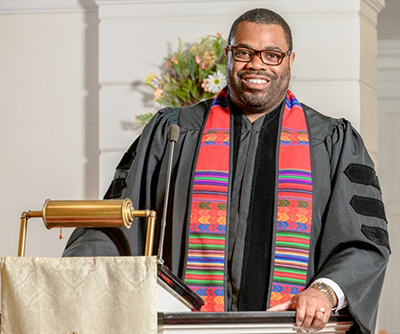The Pension Boards interviews the Rev. Dr. Michael L. Sloan, Senior Pastor for The First Congregational Church in Spencerport, New York, to learn of his experiences with the Ministers’ Financial Vitality Initiative (MFVI) program, a three-year personal finance program designed to alleviate the debt burden of UCC authorized ministers. Rev. Sloan is also a participant in the Next Generation Leadership Initiative (NGLI). Both programs are administered by the United Church Board for Ministerial Assistance, the philanthropic arm of the Pension Boards.
Q1: How did you learn about the MFVI program, and how has your financial approach changed since joining MFVI?
I had no idea what MFVI was. I reached out to the Associate Conference Minister, and he explained the MFVI program to me. So, I said, “Sure. I’d like to join and apply. I’ll give it a shot.” That’s how I found out about it—it was just a random email. In regard to my financial situation, the best way I can say this is I now have a much better understanding of my finances. Since joining MFVI, I got married, so that has made things more economically viable. But mostly, I have a better grasp of the resources that MFVI has provided.
Q2: How has MFVI specifically helped you address a personal or educational debt challenge, and has a financial planner helped you overcome these challenges?
I would say that one of the things that has helped me tremendously are the incentives that we receive every summer. I paid down some credit card debt and I was able to take advantage of a loan opportunity through the Pension Boards’ Generations Financial Resources, Inc. (a specialty lending company). The loan helped me to consolidate some of our debt. So those two things were extremely helpful.
One of the things that a financial planner helped me do was to rearrange how I was investing my pension contributions from the church. The planner showed me some of the things I was investing in, and then pointed me in a much better direction.
Q3: We understand that a number of UCC clergy deal with shame or anxiety concerning their personal finances. What words would you share to help us understand how clergy might be navigating this delicate side of personal finance?
Shame and anxiety are things that clergy deal with regularly. I remember when I was in Illinois, pastoring a small church. The church was only able to pay me $1,500 a month with benefits, so there was a lot of anxiety and shame that came along with that. Obviously, you don’t really want people to know how much you make or your personal economic situation. An example was when I had taken out a small loan through one of those small lending companies, because I was not making that much money. The person from that lending company showed up on a Sunday morning. Shame is definitely an issue.
The advice I would give other clergypersons in unique financial situations is just practice the basics of creating a budget and sticking with it. That is very, very important. Recently, I was speaking to another friend of mine who is a pastor, and he had some tax issues because as clergy— I know for me and many of my friends—we don’t have taxes taken out of our paycheck. So, one thing that I told him to do was to create an online account with no ATM card, enable automatic transfers from his direct deposit each payday, with the instruction not to touch it. Believe it or not, that’s a strategy that I created five or six years ago, and it’s helped me tremendously. So there are tricks to the trade that an individual can do once they have created a basic budget that works for them.
Also, a year after my wife and I got married, I went to our taxperson and that next year in February, the tax person looked at us and said, “Okay, that’ll be five thousand excess dollars.” My wife asked, ”Where’s that money coming from?” I replied, “We have it.” Every paycheck, we put money away in a virtual account, with no ATM card.
Q4: You are also part of the Next Generation Leadership Initiative (NGLI). Have the learnings and experiences of the NGLI and MFVI programs intersected in any way? Or, how have they differed?
They are two different programs, but there is some overlap. MFVI helps with the financial wellness side, as does NGLI— they have contributed $6,000 to my pension, and NGLI focuses on congregational leadership and on personal reflection. I think for me, both programs have given me access to information and resources, including people resources, that I would not have had otherwise. There are people who have grown up in the UCC, and they have no idea what resources we offer. It is important that we continue to communicate what we offer to clergy, so they continue to utilize the resources and programs available to them, as I have personally benefitted.
Watch Rev. Dr. Sloan share more about MFVI during General Synod 34.

The Rev. Dr. Michael L. Sloan has served as Senior Minister of First Congregational Church of Spencerport, New York, since February of 2019. He also serves as President of Spencerport Ecumenical Ministries, as a Committee Member of the Genesee Valley Association’s Committee on Church & Ministry, and as a Board Member of the New York Conference.
